
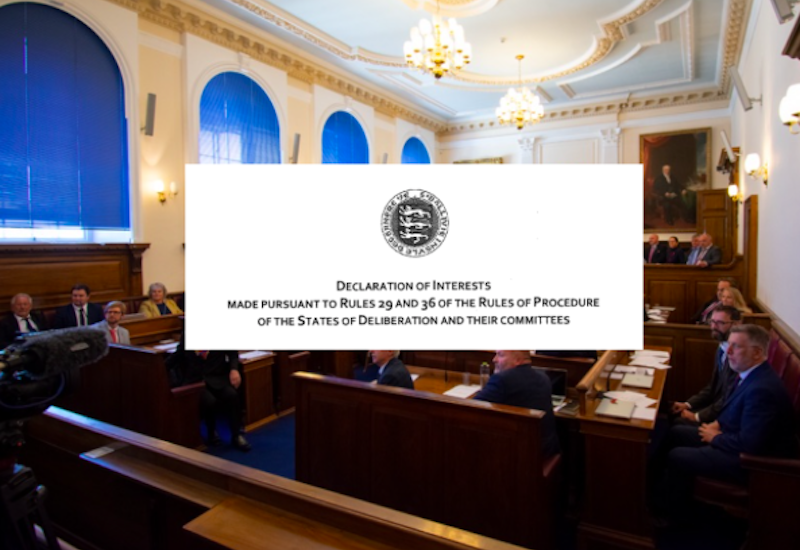

Each year, deputies are required to declare their financial interests outside the States. These declarations are published on the States' website and can be viewed through the office of the States' Greffier.
One purpose - indeed, the main purpose - of the declarations is to shed light on potential conflicts of interest between a member's public duties in the States' Assembly and in committees and private financial or commercial interests.
Express looked into whether the rules around members' declarations are transparent enough.
Recently, Express asked: Should deputies declare covid-19 funds paid to their businesses? Some deputies we spoke to thought they should. But many disagreed because requiring such declarations would identify businesses which had received States' financial support during the pandemic. Ironically, this now appears to be the view of the Policy & Resources Committee despite the Committee initially wanting to reserve the right to publish which businesses had received public funds before backing down and dropping that requirement following strong criticism from some sections of industry.
While looking into States' payments to keep businesses afloat during covid, two things became apparent about the requirements on deputies to declare their financial interests.
First, several deputies' submissions were more than a year out of date.
Second, and perhaps more substantially, the current rules seem to provide wide discretion for deputies to decide how open or opaque they want to be when declaring companies in which they have a financial interest.
Rule 29 of the States' Rules of Procedure requires deputies to submit annual declarations to the States’ Greffier. And there is an additional requirement on deputies to update declarations within three months of any changes in their private interests. However, Express found that, according to the States' published records, six deputies had failed to submit declarations for more than a year.
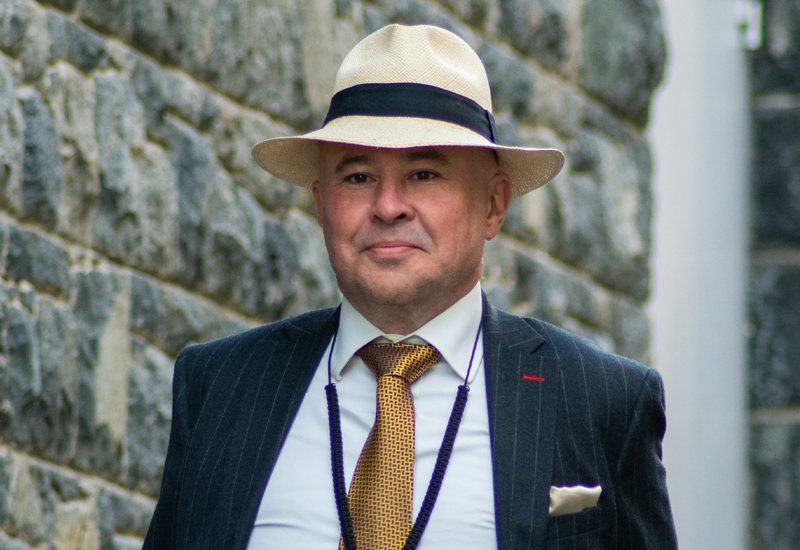
Pictured: Deputy Carl Meerveld does not see a case for changing the rules governing the financial interests which deputies need to declare.
One of the six was Deputy Carl Meerveld, the President of the States' Assembly and Constitution Committee, which oversees the Rules of Procedure, including the rules around declarations.
Each deputy is responsible for making his or her declaration, but Deputy Meerveld said: "The Greffier usually sends an email chasing people who have not made a filing on time. I made a declaration saying that there would be no changes since my last declaration."
He said he would ask the States' Greffier to send him a form on which he could declare his interests “so there is the appearance of renewal".
The other deputies who, according to the published records, had not submitted their declarations by the time required were Andrea Dudley-Owen, John Gollop, Marc Leadbeater, Charles Parkinson and Rob Prow.
Express discussed with Deputy Meerveld a peculiarity of the rules around declarations which could - and seemingly do - allow some potential conflicts of interest and particularly financial interests in companies not to be declared by deputies on their annual published forms.
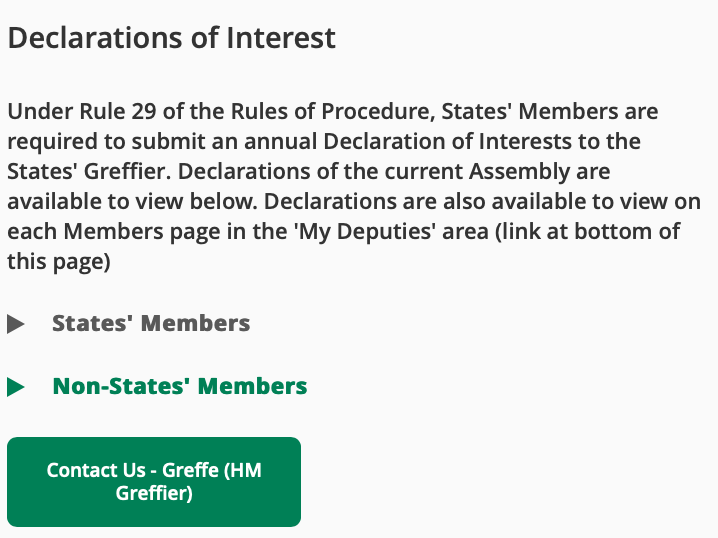
Pictured: LINK - Deputies' declarations are published on the States' website.
In September, the States voted in favour of a policy to quarry Chouet headland. This essentially paves the way for Ronez to move quarrying from Les Vardes to Chouet. During this debate, two deputies - John Dyke and Mark Helyar, both members of The Guernsey Party - declared financial interests in the matters being discussed. In doing so, they were acting fully as required by the States' Rules of Procedure.
Deputy Helyar told the States' Assembly: “Under Rule 17(15), I need to declare an interest in the subject matter, as I believe I am an independent, indirect shareholder in SigmaRoc, and for those reasons I shall be abstaining from the vote." Deputy Dyke announced a similar financial interest.
SigmaRoc is the parent company of Ronez.
However, neither SigmaRoc nor Ronez appear on either of the annual declaration of interests forms submitted to the States' Greffier by Deputies Helyar and Dyke.
The reason for this is that their financial interests in these local companies are contained within investment or holding vehicles. These vehicles are declared on the deputies' forms but have names which give no indication as to their activities or the companies in which they have an interest.
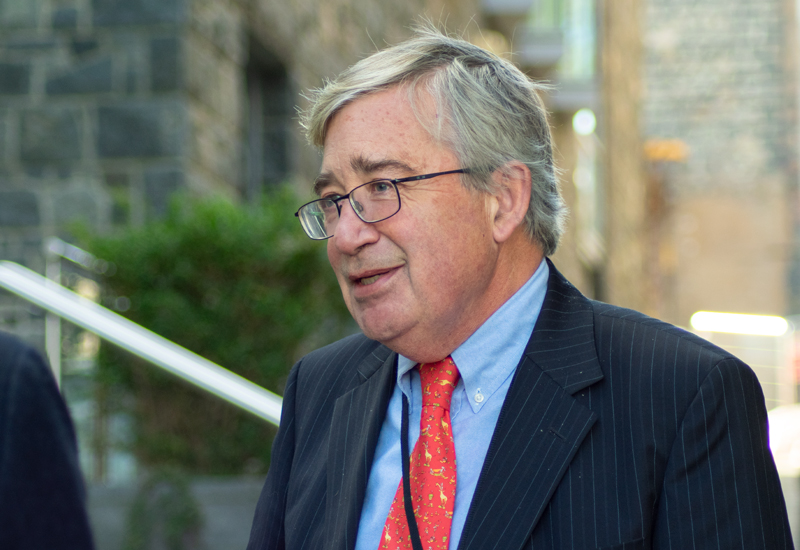
Pictured: In the States' Assembly, Deputy John Dyke recently declared financial interests which are unclear on his declaration form submitted to the States' Greffier.
Express asked Deputies Helyar and Dyke why their financial interests in significant local companies did not appear in their annual published declarations.
Deputy Helyar replied citing his investment vehicle.
Deputy Dyke said: "The investments are not significant enough to require formal disclosure in the annual filings. It would be impossible to declare all portfolio investments, especially indirect ones as one can never know what an investment fund holds on any given day."
Deputy Dyke said that he was, however, aware of his financial interests in Ronez through an investment fund which he manages and therefore declared it publicly in the States' Assembly on the day of the debate on quarrying.
Deputy Sasha Kazantseva-Miller is concerned about the transparency of declarations.
She told Express: “The declaration of interests form asks deputies to certify that, to the best of their knowledge and belief, the declaration gives full and complete particulars of all matters that deputies are required to declare.
“Therefore, it should not matter how interests are held, whether directly or through an investment company. There are quite clear instructions that these need to be declared and so, where relevant, they should be disclosed on a look-through basis.”
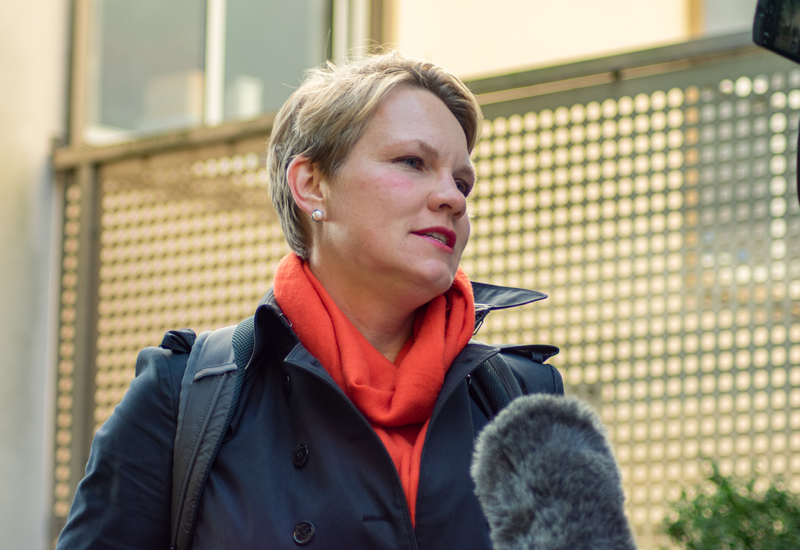
Pictured: Deputy Sasha Kazantseva-Miller does think it is transparent enough for deputies to include in their declarations only the names of investment or holding vehicles while omitting to mention companies in which those vehicles have a financial interest.
The declaration form allows for any interests to be included, even encouraging appendices where more explanation could be provided in the interests of transparency.
“However, there is no enforcement as to how forms are filled in," said Deputy Kazantseva-Miller. "And so, in the end, it's up to each deputy how they choose to interpret the declaration and fill in the form."
A good example of an extensive declaration providing more transparency than might strictly be required by the rules is the one submitted by the President of the Policy & Resources Committee, Deputy Peter Ferbrache.
He has submitted an appendix breaking down his investments in holding companies and the conflicts which could potentially arise from them and, if they did arise, would need to be managed. Express invited Deputy Ferbrache to share his opinion on whether the approach he has taken should be required by the rules and enforced on all deputies, but did not receive a reply in time for publication.
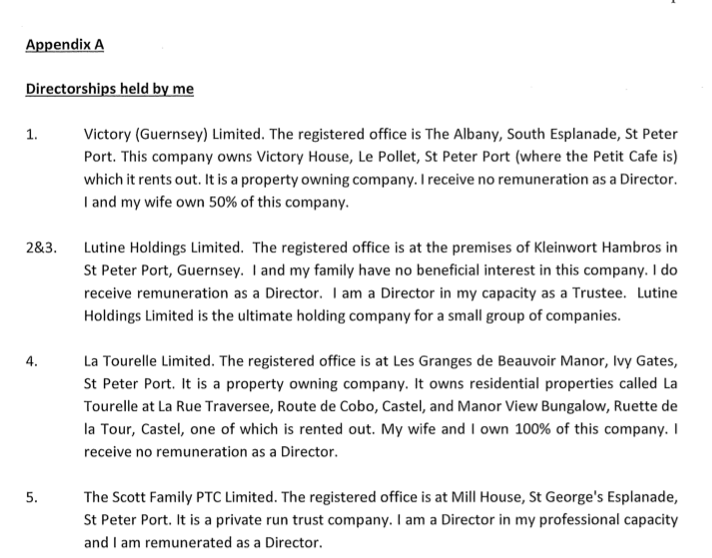
Pictured: Deputy Peter Ferbrache's declaration sets out in considerable detail the scope of his investments and any conflicts of interest which could potentially arise from them and would then need to be managed.
Deputy Meerveld argued that a line must be drawn somewhere and that deputies cannot be expected to break down every personal financial interest however large or small.
“What level do you want to drill down to, what level of interest – should a declaration include every asset of a company, every subsidiary it owns, every single physical property that it owns," said Deputy Meerveld. "At what point does it stop?”
“It’s a case of what is in the public interest and what are we trying to achieve here. What we are trying to achieve is transparency over the high-level holdings.”
Deputy Meerveld said that some deputies may not even know all their financial interests outside the States which could potentially be perceived as creating conflicts of interest - for example, as also suggested by Deputy Dyke, because investment vehicles may change their holdings frequently.
“I think the declaration of interests is an important vehicle," said Deputy Meerveld.
"It takes a practical and pragmatic approach to what needs to be declared and then it’s up to each deputy to make a declaration either in committee or in the Assembly if they are aware of a conflict of interest.
“Also, how organised are you? If you own shares in a local company, are you keeping track of every single business locally that you have an interest in, or do you simply have a share in a local company."

Pictured: The difference between the declaration form lodged by Deputy Peter Ferbrache and the one lodged by Deputy Mark Helyar highlight how much discretion deputies have when deciding what to include or exclude from their published submissions. Deputy Ferbrache's form includes an extensive appendix volunteering more information than required by the rules. Deputy Helyar recently declared financial interests in a matter before the States' Assembly which are not clear from his published declaration form.
Deputy Meerveld said it was also important to consider deputies' privacy and whether they should really "become public property” once elected.
“If you start with that expectation - that because you’ve stood for public office we should know about and control everything you do and say – how many people are not going to want to do that?” he said.
Comments
Comments on this story express the views of the commentator only, not Bailiwick Publishing. We are unable to guarantee the accuracy of any of those comments.